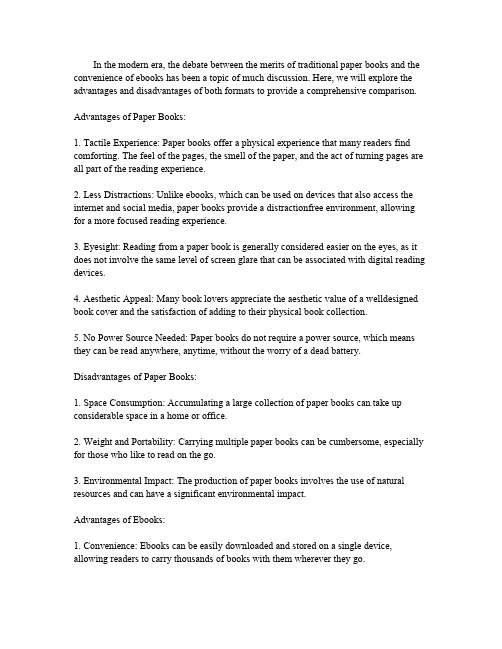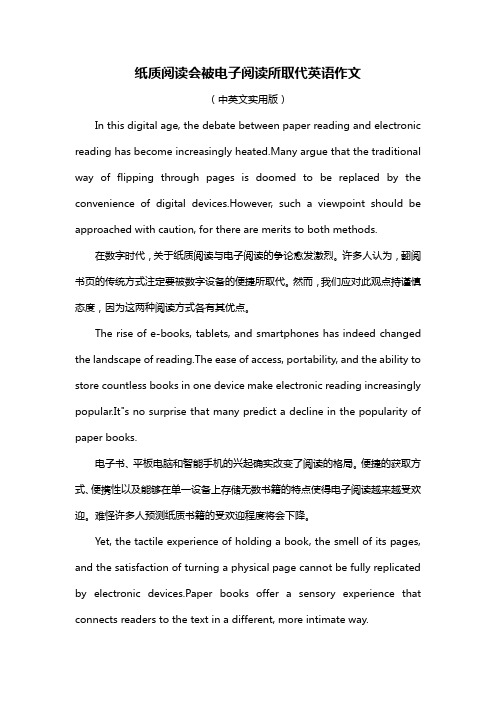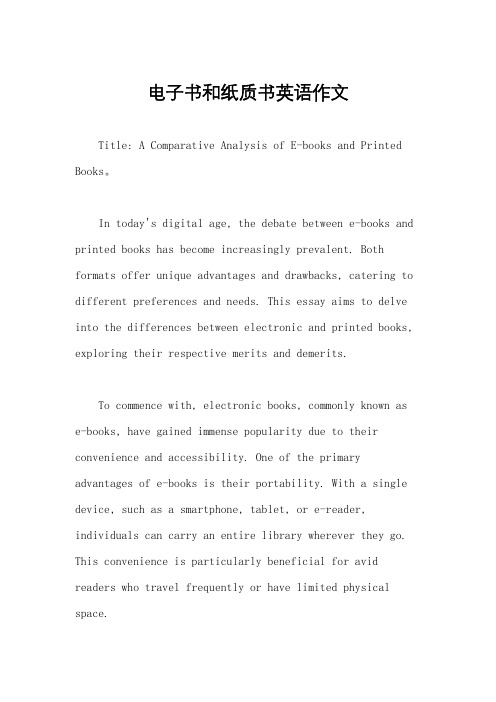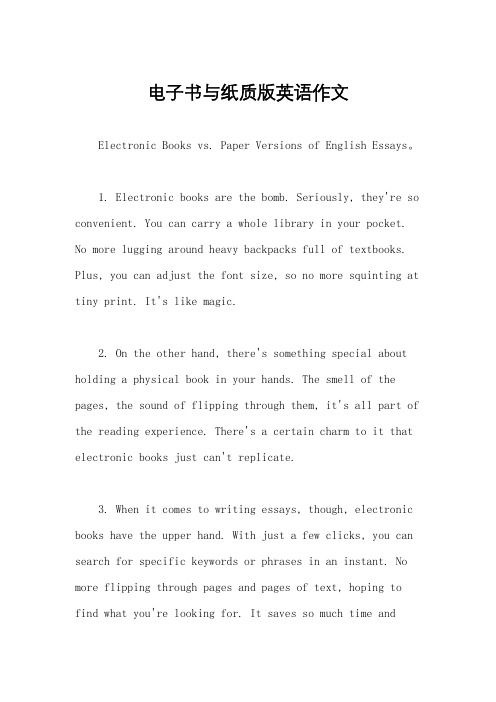电子书与纸质书辩论赛四辩(英文版)
电子书和纸质书英语作文

电子书和纸质书英语作文Title: A Comparative Analysis: E-books versus Printed Books。
In the digital age, the debate between e-books and printed books continues to spark discussions among avid readers and scholars alike. Both mediums offer unique advantages and drawbacks, catering to different preferences and needs. This essay delves into the comparison between e-books and printed books, examining their impact on reading experiences, accessibility, environmental concerns, and cultural significance.Firstly, let's explore the reading experience provided by each medium. E-books, with their portability and convenience, have revolutionized the way people access literature. With just a few taps on a screen, readers can carry an entire library in their pocket, enabling them to read anytime, anywhere. Additionally, e-readers often offer features like adjustable font sizes and built-indictionaries, enhancing readability and comprehension for users. On the other hand, printed books provide a tactile experience that many readers find irreplaceable. The smellof ink on paper, the satisfaction of turning physical pages, and the visual appeal of a well-designed cover contributeto the immersive experience of reading a printed book. For some, nothing can compare to the sensation of holding a tangible book in their hands.Accessibility is another crucial aspect to consider. E-books have democratized access to literature by eliminating barriers such as geographical distance and availability. With an internet connection, readers can instantly download a wide range of titles, including rare or out-of-print books. This accessibility is especially beneficial for individuals with disabilities, as e-books can be easily customized to accommodate different needs, such asadjustable font sizes and audio narration. Conversely, printed books may be less accessible in certain regions orto individuals with mobility challenges. However, printed books have the advantage of not requiring electronicdevices or batteries, making them accessible even in remoteareas without electricity or internet connectivity.Environmental considerations also come into play when comparing e-books and printed books. E-books are often touted as a more eco-friendly option due to their digital nature, which eliminates the need for paper production and transportation. By reducing paper consumption, e-books contribute to forest conservation and minimize carbon emissions associated with the printing industry. Furthermore, e-books eliminate the environmental impact of book disposal, as digital files do not contribute tolandfill waste. However, it's essential to acknowledge that e-readers and electronic devices have their own environmental footprint, stemming from manufacturing, energy consumption, and electronic waste disposal. Printed books, while requiring paper production, can be more sustainable if sourced from responsibly managed forests and recycled materials. Additionally, printed books hold cultural significance as tangible artifacts of humanhistory and creativity.In conclusion, the debate between e-books and printedbooks reflects the evolving landscape of reading in the digital age. Both mediums offer unique advantages and contribute to the rich tapestry of literary culture. Ultimately, the choice between e-books and printed books depends on individual preferences, reading habits, and values. Whether one prefers the convenience of e-books or the sensory experience of printed books, both mediums playa vital role in fostering literacy, knowledge dissemination, and cultural enrichment.。
纸质书和电子书英语作文

In the modern era,the debate between the merits of traditional paper books and the convenience of ebooks has been a topic of much discussion.Here,we will explore the advantages and disadvantages of both formats to provide a comprehensive comparison.Advantages of Paper Books:1.Tactile Experience:Paper books offer a physical experience that many readers find comforting.The feel of the pages,the smell of the paper,and the act of turning pages are all part of the reading experience.2.Less Distractions:Unlike ebooks,which can be used on devices that also access the internet and social media,paper books provide a distractionfree environment,allowing for a more focused reading experience.3.Eyesight:Reading from a paper book is generally considered easier on the eyes,as it does not involve the same level of screen glare that can be associated with digital reading devices.4.Aesthetic Appeal:Many book lovers appreciate the aesthetic value of a welldesigned book cover and the satisfaction of adding to their physical book collection.5.No Power Source Needed:Paper books do not require a power source,which means they can be read anywhere,anytime,without the worry of a dead battery. Disadvantages of Paper Books:1.Space Consumption:Accumulating a large collection of paper books can take up considerable space in a home or office.2.Weight and Portability:Carrying multiple paper books can be cumbersome,especially for those who like to read on the go.3.Environmental Impact:The production of paper books involves the use of natural resources and can have a significant environmental impact.Advantages of Ebooks:1.Convenience:Ebooks can be easily downloaded and stored on a single device, allowing readers to carry thousands of books with them wherever they go.2.Searchability:Ebooks often come with search functions that make it easy to find specific passages or words within the text.3.Adjustable Font Size:Readers can adjust the font size and style to suit their reading preferences,which can be particularly beneficial for those with visual impairments.4.Instant Access:With ebooks,there is no need to wait for a physical copy to be delivered they can be purchased and read almost immediately.5.CostEffectiveness:Ebooks are often less expensive than their paper counterparts,and some are even available for free.Disadvantages of Ebooks:1.Device Dependency:To read an ebook,one needs a compatible device,which can be a limitation for those without access to such technology.2.Battery Life:Ebooks require a power source,which can be inconvenient if the device runs out of battery during reading.3.Potential for Distractions:The same device used for reading ebooks can also access the internet,social media,and other distractions,which can interrupt the reading experience.4.Eyesight Concerns:Prolonged exposure to screens can cause eye strain and discomfort, although this can be mitigated with proper screen settings and regular breaks.5.Ownership and Accessibility:Ebooks are often subject to digital rights management DRM,which can limit how and where they can be read,and in some cases,may prevent permanent ownership of the content.In conclusion,the choice between paper books and ebooks often comes down to personal preference and the specific needs of the reader.While paper books offer a traditional and tactile reading experience,ebooks provide the convenience and portability of digital technology.Both formats have their place in the world of reading,and many readers choose to use a combination of both to suit their lifestyle and reading habits.。
纸质阅读会被电子阅读所取代英语作文

纸质阅读会被电子阅读所取代英语作文(中英文实用版)In this digital age, the debate between paper reading and electronic reading has become increasingly heated.Many argue that the traditional way of flipping through pages is doomed to be replaced by the convenience of digital devices.However, such a viewpoint should be approached with caution, for there are merits to both methods.在数字时代,关于纸质阅读与电子阅读的争论愈发激烈。
许多人认为,翻阅书页的传统方式注定要被数字设备的便捷所取代。
然而,我们应对此观点持谨慎态度,因为这两种阅读方式各有其优点。
The rise of e-books, tablets, and smartphones has indeed changed the landscape of reading.The ease of access, portability, and the ability to store countless books in one device make electronic reading increasingly popular.It"s no surprise that many predict a decline in the popularity of paper books.电子书、平板电脑和智能手机的兴起确实改变了阅读的格局。
便捷的获取方式、便携性以及能够在单一设备上存储无数书籍的特点使得电子阅读越来越受欢迎。
电子书和纸质书英语作文

电子书和纸质书英语作文The Debate Between E-books and Physical Books。
In the ever-evolving landscape of literature and reading, the dichotomy between e-books and physical books has become a topic of considerable debate. While both formats offer unique advantages, their respective merits and limitations have sparked heated discussions among readers, publishers, and technology enthusiasts alike.On the one hand, e-books have revolutionized the way we access and consume information. The portability of e-readers and smartphones allows readers to carry an entire library in the palm of their hands, eliminating the needfor bulky physical books. This portability is especially beneficial for those who travel frequently or commute long distances, as it significantly reduces the weight and space occupied by their reading materials. Additionally, e-books offer instant access to a vast array of titles, including rare and out-of-print works that may be difficult to findin physical form. The ability to search within the text and adjust font size and brightness also enhances the reading experience for many users.Moreover, e-books are often more environmentally friendly than physical。
电子书和纸质书英语作文

电子书和纸质书英语作文Title: A Comparative Analysis of E-books and Printed Books。
In today's digital age, the debate between e-books and printed books has become increasingly prevalent. Both formats offer unique advantages and drawbacks, catering to different preferences and needs. This essay aims to delve into the differences between electronic and printed books, exploring their respective merits and demerits.To commence with, electronic books, commonly known as e-books, have gained immense popularity due to their convenience and accessibility. One of the primary advantages of e-books is their portability. With a single device, such as a smartphone, tablet, or e-reader, individuals can carry an entire library wherever they go. This convenience is particularly beneficial for avid readers who travel frequently or have limited physical space.Moreover, e-books often provide additional featuresthat enhance the reading experience. For instance, readers can adjust font sizes, customize background colors, and utilize built-in dictionaries for instant definitions. Additionally, e-books may incorporate multimedia elements like audio narration and interactive graphics, offering a multi-sensory engagement that traditional books cannot match.Furthermore, e-books contribute to environmental sustainability by reducing paper consumption and carbon emissions associated with printing and transportation. With the increasing concern for ecological preservation, the digital format aligns with efforts to minimize waste and conserve resources.On the other hand, printed books offer a tangible and tactile experience that appeals to many readers. The sensory aspect of holding a physical book, feeling its pages, and inhaling the scent of paper and ink evokes a sense of nostalgia and intimacy. For some, this sensoryengagement enhances the emotional connection to the text and fosters a deeper appreciation for the reading experience.Additionally, printed books do not require electronic devices or batteries, making them accessible even in areas with limited electricity or internet connectivity. This accessibility is particularly crucial in regions where technological infrastructure is underdeveloped or unreliable.Moreover, printed books hold cultural and historical significance, serving as tangible artifacts of human knowledge and creativity. Libraries and bookstores, with their shelves lined with printed volumes, serve as communal spaces that foster intellectual exchange and collective learning. The physical presence of books contributes to the ambiance and character of these spaces, enriching the overall cultural landscape.However, printed books have inherent limitations compared to their electronic counterparts. They are bulkierand less portable, requiring dedicated storage space and careful handling to prevent damage. Additionally, printed books lack the customizable features of e-books, such as adjustable font sizes and search functions, which can be particularly beneficial for individuals with visual impairments or specific reading preferences.In conclusion, the choice between e-books and printed books ultimately depends on individual preferences, circumstances, and priorities. While e-books offer unparalleled convenience, customization, and environmental sustainability, printed books provide a sensory, cultural, and historical experience that resonates with many readers. Ultimately, both formats contribute to the rich tapestry of human literary expression, each offering its unique blend of advantages and charm. As technology continues to evolve, the coexistence of e-books and printed books ensures that readers can enjoy diverse reading experiences tailored to their needs and preferences.。
电子书与纸质版英语作文

电子书与纸质版英语作文Electronic Books vs. Paper Versions of English Essays。
1. Electronic books are the bomb. Seriously, they're so convenient. You can carry a whole library in your pocket. No more lugging around heavy backpacks full of textbooks. Plus, you can adjust the font size, so no more squinting at tiny print. It's like magic.2. On the other hand, there's something special about holding a physical book in your hands. The smell of the pages, the sound of flipping through them, it's all part of the reading experience. There's a certain charm to it that electronic books just can't replicate.3. When it comes to writing essays, though, electronic books have the upper hand. With just a few clicks, you can search for specific keywords or phrases in an instant. No more flipping through pages and pages of text, hoping to find what you're looking for. It saves so much time andfrustration.4. But let's not forget about the joy of underlining and highlighting in a paper book. There's something satisfying about physically marking up the text, making it your own. It helps with comprehension and retention too.It's like having a conversation with the author, leaving your thoughts and reactions right there on the page.5. Another advantage of electronic books is the ability to access additional resources with just a tap. You can instantly look up definitions, translations, or evenrelated articles. It's like having a personal research assistant right at your fingertips. It's a game-changer for writing essays.6. However, there's a certain nostalgia associated with paper books. Remember the days of dog-earing pages and writing notes in the margins? It's a personal touch that electronic books can't replicate. It's like leaving a piece of yourself behind in the book, a little reminder of your journey through the text.7. In conclusion, both electronic books and paper versions have their pros and cons. Electronic books offer convenience, searchability, and access to additional resources. On the other hand, paper books provide a tactile experience, a sense of nostalgia, and the joy of marking up the text. So, whether you prefer the digital world or the traditional one, there's no denying that both have their place in the world of English essays. It's all aboutfinding what works best for you.。
电子书纸质书作文英语模板
电子书纸质书作文英语模板Title: A Comparison between Electronic Books and Print Books。
In the modern age, the debate over whether electronic books (e-books) or print books are superior has become increasingly relevant. Both formats have their own merits and drawbacks, and individuals often have strong opinions on which they prefer. In this essay, we will explore the various aspects of both e-books and print books, considering factors such as accessibility, convenience, environmental impact, reading experience, and personal preferences.Accessibility is a key factor to consider when comparing e-books and print books. E-books have the advantage of being instantly accessible with just a few clicks or taps on a device. This means that readers can easily access a vast library of books without the need for physical storage space. Additionally, e-books often offerfeatures such as adjustable font sizes and built-in dictionaries, making them more accessible to individuals with visual impairments or those learning a new language.On the other hand, print books also have their own accessibility benefits. Unlike e-books, print books do not require access to electronic devices or an internet connection. They can be read anytime, anywhere, without worrying about battery life or screen glare. Furthermore, print books can be shared and borrowed easily, allowing for a sense of community among readers.Convenience is another important factor to consider. E-books are often praised for their convenience, as they allow readers to carry an entire library of books in a single lightweight device. This is particularly advantageous for travelers or individuals with limited storage space. Additionally, e-books can be purchased and downloaded instantly, eliminating the need to visit a physical bookstore.However, some argue that print books offer a differentkind of convenience. There is a tactile satisfaction that comes with holding a physical book in one's hands, flipping through its pages, and annotating passages with handwritten notes. Furthermore, print books do not rely on technology and are not subject to issues such as software glitches or device compatibility.Environmental impact is a concern that is often raised in discussions about e-books versus print books. E-books are often touted as a more environmentally friendly option, as they do not require paper, ink, or transportation for distribution. This can help reduce deforestation and carbon emissions associated with the production and transportation of print books.However, the environmental impact of e-books is not negligible. E-readers and other electronic devices require the mining of precious metals and other natural resources for their production. Additionally, the energy consumption associated with manufacturing and using these devices contributes to greenhouse gas emissions. Furthermore, electronic devices have a limited lifespan and often end upin landfills once they become obsolete.In terms of reading experience, opinions vary widely between e-books and print books. Some readers prefer the convenience and versatility of e-books, while others argue that nothing can replace the sensory experience of reading a print book. Factors such as the smell of ink and paper, the weight of the book in one's hands, and the satisfaction of turning physical pages all contribute to the appeal of print books for many readers.Ultimately, the choice between e-books and print books boils down to personal preference. Some individuals may prefer the convenience and accessibility of e-books, while others may value the sensory experience and aesthetic appeal of print books. Regardless of which format one prefers, it is important to recognize that both e-books and print books have their own unique advantages and drawbacks. In an increasingly digital world, the coexistence of both formats allows readers to choose the option that best suits their needs and preferences.In conclusion, the debate over electronic books versus print books is multifaceted, with arguments to be made for both formats. While e-books offer advantages in terms of accessibility and convenience, print books provide a unique reading experience and have a lower environmental impact in some respects. Ultimately, the choice between e-books and print books is a personal one, and readers should consider their own preferences and priorities when making a decision.。
电子书和纸制书英文辩论
Dear teacher and opposite debaters, thanks to the opposite debaters statement. Now, it is the time for me to do the summary address.Our debaters adhere to the view that “e-books have more advantages than paper-books”. From the beginning to the end, we listed the advantages of e-books in several aspects, such as easy-reading in the dark , text searching, text tweaking , much higher portability, much more practical annotations and book-sharing, and so on. And we find that the paper-books as the traditional way of reading have the unavoidable shortcoming such as the expensive price compared with the E-books, and the inconvenience of being carried because of the volume and weight. And so on.With the rapid development of computer science, many people who has a computer or other e-book viewers are reading books on line. More and more people feel that the e-books are better than the traditional books for their low cost and convenience to acquire. E-books could be 80% cheaper than the paper ones. Sometimes it is even free when they're under promotion. You can find millions of free e-books. They can be got in the public domain. But paper books can't be heavily discounted, due to the printing cost, so you have to pay for them.In the later future, batteries will last incredibly longer because of the great increase of technology. If you are going on holiday to a sunny location, carrying a few chunky and heavy books are difficult to transport. However, e-books are literally weightless compared to paper books. In some airports there are weight restrictions on luggage and it is much easier to take one thing rather than a few things.From the comparison, we conclude that e-books have more advantages than paper-books. Furthermore we strongly believe that e-readers will become the future of books.That is all, thank you!。
纸质阅读和电子阅读的观点英语作文
纸质阅读和电子阅读的观点英语作文英文回答:In my opinion, both paper reading and electronicreading have their own advantages and disadvantages.On one hand, paper reading provides a unique reading experience. The feel and smell of a physical book can be very enjoyable. Turning the pages and seeing the progress made in the book is satisfying. Additionally, paper booksdo not require any technology or electricity, making them accessible in any situation. For example, when I go camping, I prefer to bring a paperback book with me because I don't have to worry about charging my e-reader.On the other hand, electronic reading offers convenience and accessibility. With just one device, I can carry thousands of books with me wherever I go. This is especially useful when traveling, as I can have a varietyof reading options without the added weight of physicalbooks. Furthermore, e-books often have features like adjustable font size and built-in dictionaries, making it easier to read and understand the content. For instance, when I come across a difficult word while reading an e-book, I can simply tap on the word to get its definition.However, there are some drawbacks to electronic reading as well. One of the main concerns is eye strain. Staring at a screen for a long time can cause discomfort and fatigue. Moreover, the blue light emitted by electronic devices can disrupt sleep patterns. Another disadvantage is thepotential for distractions. When reading on a tablet or smartphone, it is easy to get distracted by notificationsor other apps. For example, I often find myself checking social media or emails while trying to read on my e-reader.In conclusion, both paper reading and electronicreading have their own merits and drawbacks. Paper reading provides a unique sensory experience and does not require any technology, while electronic reading offers convenience and accessibility. Ultimately, the choice between the two depends on personal preferences and circumstances.中文回答:在我看来,纸质阅读和电子阅读都各有优劣。
纸质书优缺点英文作文
纸质书优缺点英文作文英文回答:Advantages of Paper Books.Tangible and durable: Paper books are physical objects that can be held, touched, and smelled, unlike electronic books. This tangible quality can be comforting and satisfying for many readers. Paper books are also more durable than electronic devices and less likely to be damaged or lost.Immersive experience: Reading a paper book can be a more immersive experience than reading an electronic book. The absence of distractions (such as notifications or the temptation to browse the internet) can allow readers to focus more deeply on the text.Aesthetic appeal: Many people find paper books to be more aesthetically pleasing than electronic books. Thephysical form of a book, with its cover, pages, and typography, can be a work of art in itself.Personalization: Paper books can be personalized in ways that electronic books cannot. Readers can add notes, highlights, and drawings to their physical copies, making them unique and meaningful.No eye strain: Reading from a printed page does not put as much strain on the eyes as reading from a screen. This can be especially important for people who spend a lot of time reading.Disadvantages of Paper Books.Limited portability: Paper books are bulky and heavy, which can make them difficult to carry around. This is especially problematic for people who have to commute or travel frequently.Environmental impact: The production of paper books requires the use of trees, which can contribute todeforestation. Additionally, the manufacturing and disposal of paper books can generate waste and pollution.Cost: Paper books can be more expensive thanelectronic books. This is especially true for new releases or rare editions.Storage space: Storing a large collection of paper books can require a lot of space. This can be a problem for people who live in small spaces or who have limited storage options.Susceptibility to damage: Paper books can be easily damaged by water, fire, or other environmental factors. This can be a major concern for collectors or people who own rare or valuable books.中文回答:纸质书的优点。
- 1、下载文档前请自行甄别文档内容的完整性,平台不提供额外的编辑、内容补充、找答案等附加服务。
- 2、"仅部分预览"的文档,不可在线预览部分如存在完整性等问题,可反馈申请退款(可完整预览的文档不适用该条件!)。
- 3、如文档侵犯您的权益,请联系客服反馈,我们会尽快为您处理(人工客服工作时间:9:00-18:30)。
Dear teacher and opposite debaters, thanks to the opposite debaters' statement. Now, it is the time for me to do the summary address. Our debaters hold the view that "e-books are better than paper books", from the beginning to the end, we listed the advantages of e-books in several aspects, such as convenience, cost, fashion and so on. Many of us read e-books nowadays. We all know that e-books have been becoming a trend.
And we found that the paper-books have many shortcomings in carrying, correcting, storing, cost and so on. Many trees needed to make the paper books, which make the paper books more expensive. And our consumers must pay for the transport fee. From the comparison, we can foresee that e-books are better than paper books.
Besides, no trees are required to manufacture paper for the pages of e-books, which is a very useful way to protect the environment; e-books take up less space. You practically don't need any space to store them. You don't need a library or a room for them. You can store hundreds and thousands of e-books in your computer. With today technology you can read e-books you loved wherever you are, on the bus, train, airplane and while standing in line.
What’s more, for some latest and fashional readings, e-books best choices. That’s all, thank you.。
